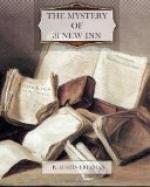“When is this voyage of exploration to take place?”
Thorndyke considered this question, and, taking out his pocket-book, glanced through his engagements.
“It seems to me,” he said, “that to-morrow is a fairly free day. We could take the morning without neglecting other business. I suggest that we start immediately after breakfast. How will that suit my learned friend?”
“My time is yours,” I replied; “and if you choose to waste it on matters that don’t concern you, that’s your affair.”
“Then we will consider the arrangement to stand for to-morrow morning, or rather, for this morning, as I see that it is past twelve.”
With this Thorndyke gathered up the chart and instruments and we separated for the night.
Chapter IX
The House of Mystery
Half-past nine on the following morning found us spinning along the Albert Embankment in a hansom to the pleasant tinkle of the horse’s bell. Thorndyke appeared to be in high spirits, though the full enjoyment of the matutinal pipe precluded fluent conversation. As a precaution, he had put my notebook in his pocket before starting, and once or twice he took it out and looked over its pages; but he made no reference to the object of our quest, and the few remarks that he uttered would have indicated that his thoughts were occupied with other matters.
Arrived at Vauxhall Station, we alighted and forthwith made our way to the bridge that spans Upper Kennington Lane near its junction with Harleyford Road.
“Here is our starting point,” said Thorndyke. “From this place to the house is about three hundred yards—say four hundred and twenty paces—and at about two hundred paces we ought to reach our patch of new road-metal. Now, are you ready? If we keep step we shall average our stride.”
We started together at a good pace, stepping out with military regularity and counting aloud as we went. As we told out the hundred and ninety-fourth pace I observed Thorndyke nod towards the roadway a little ahead, and, looking at it attentively as we approached, it was easy to see by the regularity of surface and lighter colour, that it had recently been re-metalled.
Having counted out the four hundred and twenty paces, we halted, and Thorndyke turned to me with a smile of triumph.
“Not a bad estimate, Jervis,” said he. “That will be your house if I am not much mistaken. There is no other mews or private roadway in sight.”
He pointed to a narrow turning some dozen yards ahead, apparently the entrance to a mews or yard and closed by a pair of massive wooden gates.
“Yes,” I answered, “there can be no doubt that this is the place; but, by Jove!” I added, as we drew nearer, “the nest is empty! Do you see?”
I pointed to a bill that was stuck on the gate, bearing, as I could see at this distance, the inscription “To Let.”




